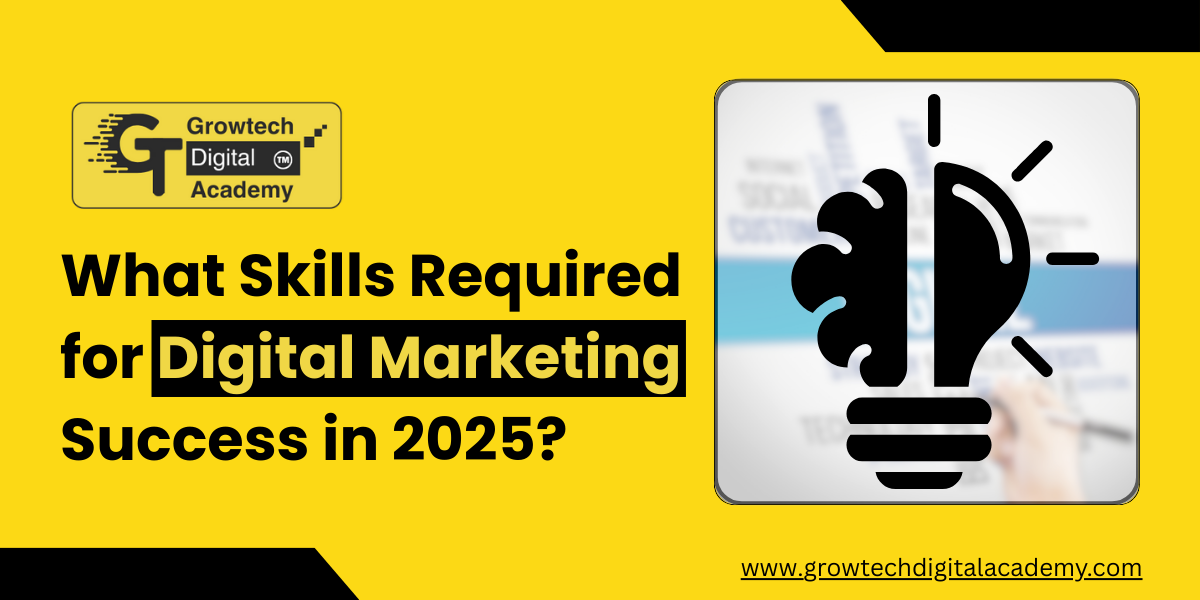Introduction:
Digital marketing’s no longer a luxury; it’s a necessity for businesses wanting to thrive in the digital-first world. But hold up—venturing into digital marketing isn’t just about knowing how to post on social media or write an email. It’s an intricate blend of technical expertise, creativity, strategic thinking, and a good dose of adaptability. Wondering what skills are required for digital marketing to make it big in 2025? Let’s dive in!

What Skills Required for Digital Marketing?
Here’s the good news: digital marketing isn’t rocket science, but it does demand a unique cocktail of creativity, data analysis, and tech-savviness. Here’s a breakdown of the must-have skills:
SEO and SEM Expertise
Search Engine Optimization (SEO) and Search Engine Marketing (SEM) are the bread and butter of digital marketing. If your content isn’t discoverable, it’s as good as invisible. Understanding SEO tools, keyword research, on-page and off-page SEO tactics, and paid ad strategies can set you apart.
- Know how search engines like Google rank content.
- Master tools like Google Analytics, Ahrefs, and SEMrush.
- Learn how to structure ad campaigns and optimize budgets for SEM.
Content Creation and Copywriting
Content is still king, but only if it grabs attention. Whether you’re writing blogs, creating videos, or designing infographics, the ability to craft engaging, value-driven content is crucial. Copywriting, on the other hand, is about persuasive writing—think ad copy or CTAs that convert leads into customers.
- Brush up on storytelling techniques.
- Learn to tailor content for different platforms (e.g., Instagram vs. LinkedIn).
- Stay updated with trends like short-form video content or interactive content.
3. Data Analytics and Interpretation
Data doesn’t lie—and in digital marketing, it’s the holy grail. Analyzing metrics like click-through rates (CTR), conversion rates, and customer demographics can help optimize campaigns for better ROI.
- Get comfortable with tools like Google Analytics, Tableau, or even Excel.
- Understand metrics like bounce rates, session durations, and traffic sources.
- Leverage data to predict trends and tweak strategies in real-time.
4. Social Media Marketing
What Skills Required for Digital Marketing
Social media isn’t just about posting cute cat videos—it’s a dynamic playground for brands to connect with their audiences. Knowing the nuances of platforms like Facebook, Instagram, LinkedIn, and snapchat is a must.
- Understand each platform’s algorithm and audience behavior.
- Master paid advertising on social platforms (e.g., Facebook Ads Manager).
- Stay consistent with branding and engagement strategies.

Email Marketing What Skills Required for Digital Marketing
Despite the buzz around social media, email marketing remains a powerful tool. Personalized, timely emails can nurture leads and drive conversions.
- Learn to use email marketing platforms like Mailchimp or HubSpot.
- Understand segmentation, automation, and A/B testing.
- Focus on crafting compelling subject lines and CTAs.
6. Basic Design Skills
You don’t need to be a professional graphic designer, but having a knack for aesthetics helps. Tools like Canva or Adobe Spark can help you create visually appealing content without breaking a sweat.
- Learn the basics of color theory and typography.
- Focus on creating designs that align with your brand identity.
- Use templates and tools to save time without compromising quality.
7. Paid Advertising Knowledge
Running ads on platforms like Google and Facebook requires more than just throwing money at them. You need to understand targeting, bidding strategies, and performance metrics.
- Study Google Ads and Facebook Ads Manager.
- Learn audience segmentation and retargeting techniques.
- Keep up with changes in ad policies and algorithms.
8. Video Marketing Skills What Skills Required for Digital Marketing
Video content continues to dominate. Whether it’s short Snapchat or long-form YouTube content, marketers who can script, edit, and promote videos hold a significant advantage.
- Learn the basics of video editing using tools like Adobe Premiere Pro or iMovie.
- Focus on creating thumb-stopping intros and engaging narratives.
- Optimize videos for SEO using captions, tags, and descriptions.
9. Customer Relationship Management (CRM)
Managing customer interactions and relationships effectively can boost retention rates. Familiarity with CRM tools is a bonus.
- Explore platforms like Salesforce, Zo ho, or HubSpot.
- Learn how to track customer journeys and touchpoints.
- Use CRM insights to personalize marketing campaigns.
10. Adaptability and Lifelong Learning
Digital marketing isn’t static—what works today might be obsolete tomorrow. Being adaptable and open to learning is arguably the most critical skill.
- Stay updated with industry blogs, podcasts, and webinars.
- Experiment with new tools and platforms.
- Seek certifications or courses to stay ahead of the curve.
